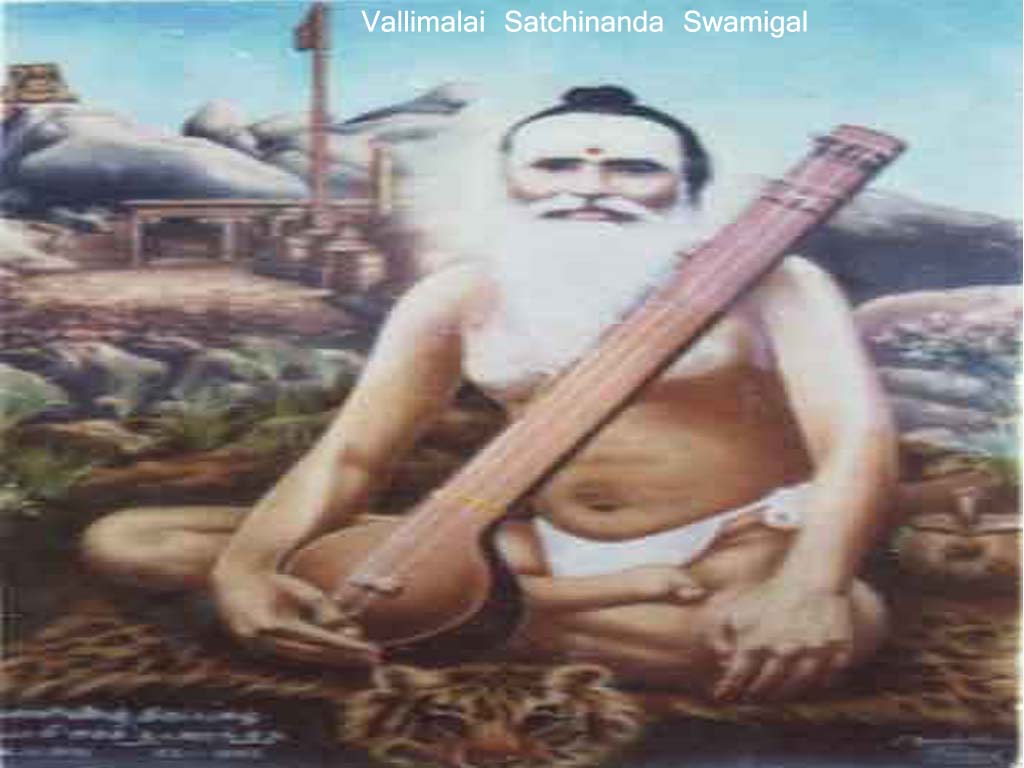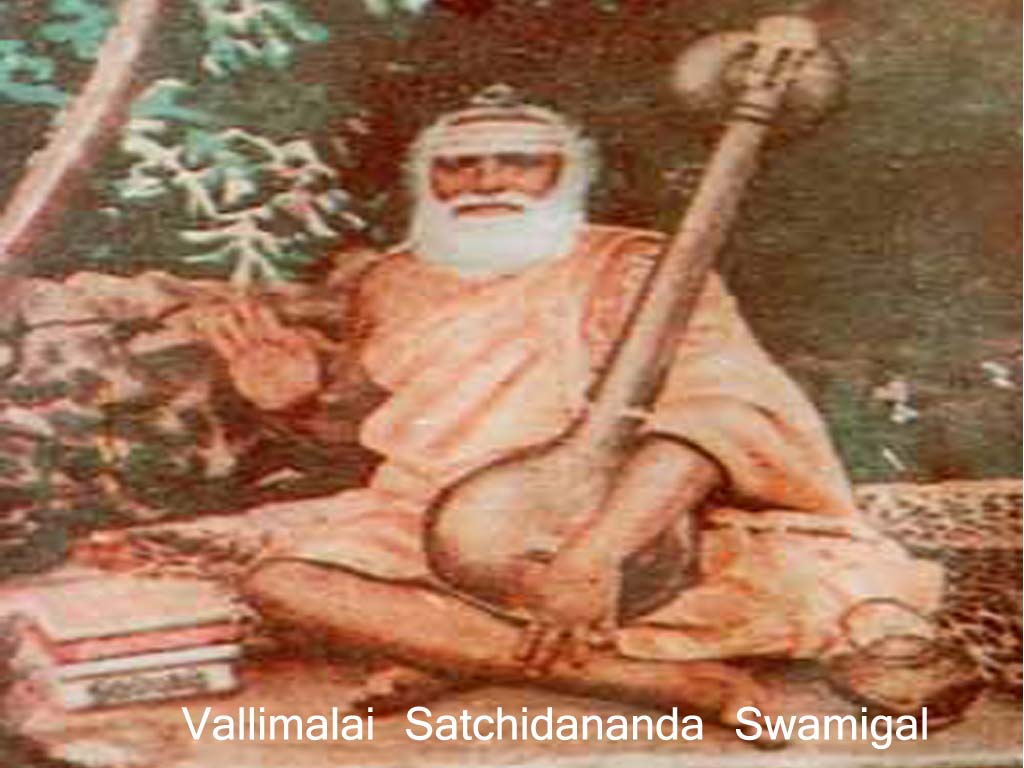Vallimalai Satchidananda Swamigal

Swami was very particular in singing Tiruppukal songs of Saint Arunagirinathar and used to explain that Saivate Saint Tirujñāna Sambandhar, who sang Tēvarām about Lord Śiva, was the incarnation of Lord Murukan. Similarly Lord Śiva came to this earth as Saint Arunagirinathar to praise Lord Murukan and show humanity the proper way to worship Him through the songs of Tiruppukal.
At Palani, Swami was ordered by Lord Murukan to go to Tiruvannamalai, the birth place of Saint Arunagirinathar, where he could come in contact with the great saint Sri Ramana Bhagawan. In Sri Ramana, Swami saw the avatar of Sri Palani Āntavar (Lord Dandapani). Swami could learn properly the meaning and candam (cadence) of Tiruppukal. By the grace of Bhagawan, he mastered everything and rendered the songs in an emotional manner.
However, by the order of Sri Ramana Bhagwan, the search for a guru by Swami ended in meeting Sri Sēśādri Swamigal at Tiruvannamalai, who has also confirmed that Tiruppukal songs are mahā mantrams, by reciting which all could be achieved. A parallel śloka from Śiva Manasīkapūja by Adi Śankara (4th śloka) was equalised by Swami by rendering a Tiruppukal song (Ācaikkor paktan).
Thenceforth Sri Seśadri Swamigal directed Swami to go to Vallimalai, the famous abode of Lord Murukan and His Consort Sri Valli, as explained in Kantap Purānam. Swami stayed at this place more than 38 years for his spiritual sādhana as well as to bless devotees irrespective of cast or creed, young or old, rich or poor. Ultimately Swami had a rare experience at Vallimalai culminating in darśan of Lord Murukan and Sri Valli.
His attachment towards Devi Sri Valli was very great. He used to tell me often that we should always praise Sri Valli through Tiruppukal songs, so that She will point out to Lord Murukan at an opportune moment all our our needs, which He will fulfil readily as the request comes from his Consort.

Swami used to find the grace of Sri Valli in all and believed that Lord Murukan alone was Purusha and all the jīvas were only His consorts. (Jīva-BrahmĀ ikyam). In this connection Swami had complied with the help of Tiruppukal songs a medical with very great spiritual significance to the theme "Tiruppukal Jñana Saccidānanda Valli Caitam" (more details later).
At Vallimalai he was a true illustrator of ideal bhakti. He never suffered for want of money or means of sustenance. But he always spent away then and there whatever money came to him and never retained a pie for morrow. He was very particular to feed the needy and believed that service to fellow beings was only true service.
He never claimed to any power to work miracles or cure diseases or grant earthly requests. Always wanted to be a true and humble bhakta and to be called as "Valli Pāda Hridayan".
Now let us ponder over Swami's philosophy, mission in life and how he could receive such rare sights including his selection of Tiruppukal songs for daily prayers, starting each day of the week in a particular order from Sunday to Saturday is not only estoric but based on principles of Yogaśacirc;stra. Each day signifies a particular yoga cakra in the body and on Saturday envelop all the six leading to Sahasrara Cakra.
It begins with salutation to Vinayaka, invocation to Lord Murukan, for abhiśekam, alankāram etc. It was given the name of Tiruppukal Parāyana Tavaneri Tirumurai - meaning that one could attain moksa by reciting (doing parāyanam).
The invocation songs in Tiruppukal Parāyana Tavaneri Tirumurai clearly stress the importance of Āru Patai Vītu and invariably akin to six Adharams of Yoga Śāstra explained as follows:
At the close of the second centuary AD a prominent devotee of Lord Murukan was Nakkīra Tēva Nāyanar, the author of Tirumurukārru Patai". He selected six temples situated in six specially sacred places and named them as Āru Patai Vītu. They are Tiruparankundram, Tiruchendur, Tiruvavinangudi, Swamimalai, Tiruttani, and Palamudircolai, i.e. Vallimalai. Those were the six holy places where Lord Murukan appeared in response to prayers offered by jñānis and saintly men on behalf of the devotees who seek His grace for eradication of their suffering as well for moksa.


Further, Saint Arunagiri Nathar, in his Kandar Anubhuti (2) has dealt with six Addāracakra thus, Ullasa - Nirakula - Yoga - Vidha - Sallabha - Vinodhanan - (Nī Allayo - Ellam Ara Ennnai Yilantanala Collai Murukan Curapūpatiye), meaning "Oh Murukan! God of Devas, are you not (1) the joyous ever the carefee, (2) the unsorrowing, (3) the great yogi, (4) the doer of good to others, (5) possessed of kindly speech, and (6) the great marvel and surprise (translated by Swami Anvananda)?
1. Sunday - Mūladhāram ; Tirupparankunram (Ullasa)
2. Monday - Swādhisthānam; Tiruccentūr (Nirakula)
3. Tuesday - Manipuram; Tiruvavinankuti (Yoga)
4. Wednesday - Anāhatam; Swāmimali (Vidha)
5. Thursday - Viśudhi; Tiruttani (Sallabha)
6. Friday - Ajña; Palamutircōlai, i.e. Vallimalai (Vinodhanan)
Swami arranged very well to achieve moksha in a yogic way by reciting Tiruppukal songs for the above six abodes of Lord Murukan from Tirupparankunram to Vallimalai to awaken the eternal fire (Kundalini Śakti) in the solar plexus (Mulādhāra).
1) unai tinam tolutitan
Kanatil in payamara mayil mutukil varauaye.
Tiruppankiri Janiurai Saravana Perumalar.
2) Muntu Jamil malai koti koti.
Cempon Mayil Mītu yeppiclu Varauaye
Centil nagar Valum Anmaikara Perumālē
3) Swanār manam kulirā
Aduyenai Arcalenai Varavenum
jagamelmai kanda viral Perumālē.
4) Enta phikayinum
Canda capai tamil enatiram urykavam varuvaye
Kanta Pholil tikal kurumali maruaiya Perumālē.
5) Tarayit manutar Acinal -
Patiya tana camūti manolayam Vantu Tarai
Vatinatamalai yavayum meviya Tampiranai
6) Akarumai
Enatu munnoti varavēntum
Malai micai meviya Perumālē.
7) Kumpakōnam ulayenkum maveya perumālō (whole world)
Swami discussed the importance of how he culled the Tiruvakuppu particularly expanded Vēlvakuppu to Vēl Maral and the importance of other vakuppus such as: (1) Kata Kaniyal Vakuppu, (2) Tēvedira Cankuvakuppu, (3) Vēl Vakuppu, (4) Sīrpāda Vakuppu, (5) Vēl Vangu Vakuppu (6) Vetici Kavalan Vakuppu.
Regarding the efficacy of the above vakuppus, Swami had sufficient experience to prove as in each of which certain aspects of Lord Murukan are sung about, such as His Holy Feet, Vēl, His Consort Valli, Peacock vāhana, etc. Further, the combination of words in every vakuppu is very mystical and divine. Saint Arunagirinathar alone could render such songs which Swami with the blessings of Lord Murukan and Sri Valli could popularise among the needy.





